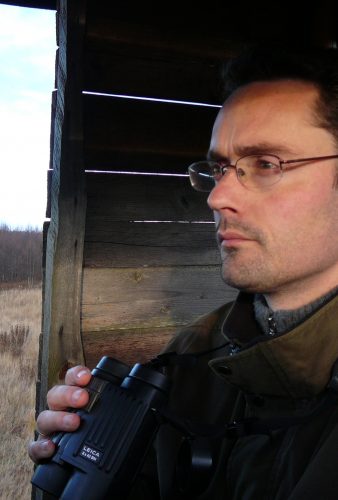- Academic title:
- dr. habil.
- Position:
- Professor MRI PAS
- Unit:
- Population Ecology

- 2013: Habilitation, Jagiellonian Univeristy, Krakow
- 2004: PhD. Biology, University of Groningen, Netherlands:
- 1999: BSc. and MSc. Biology Animal Ecology, University of Groningen
I am interested in how herbivores shape the environment around us. I started to studies these plant-herbivore interactions on the saltmarshes of the Waddensea where small small (Watervole) to intermediate-sized herbivores (Geese, Hares and Rabbits) affect salt marsh vegetation succession. Afterwards I carried out research in Spitsbergen to study how goose grazing affects arctic ecosystem processes. Since 2008 I am based in the Białowieża Primeval Forest (Poland) where you can still study how large herbivores (Bison, Moose, Red deer, Wild boar, Roe deer) affect natural tree regeneration. These studies also include how large carnivores affect behaviour and spatial distribution of their ungulate prey and the way how humans modify these trophic cascading effects.
- 2015-present, Associate professor (profesor nadzwyczajny), MRI
- 2010-2015, Post-doc position (Adiunkt), MRI
- 2007-2010, Marie-Curie fellow in the frames of BIORESC Transfer of Knowledge project (6th Framework Programme of European Commission), Zakład Badania Ssaków PAN, Białowieża
- 2005-2007 Project leader at the ecological consultancy office Altenburg & Wymenga, Netherlands
- 2004-2005 Post-doc position within the European Union 5th Framework Programme, 'Fragility of arctic goose habitat: impacts of land use, conservation and elevated temperatures' (FRAGILE) at the Arctic centre, University of Groningen, Netherlands
- 1999-2004 PhD. Biology, University of Groningen, Netherlands, Dissertation: "Small herbivores losing control: Plant-herbivore interactions along a natural productivity gradient"
In my current research team ‘Kuijper’s lab’, together with enthusiastic and complementing people, we are working on trophic cascading effects in temperate ecosystems. In particular we are interested in how large carnivores (especially wolf) affect their ungulate prey species, in terms of distribution and behavior, and in this way indirectly affect vegetation. Besides, we study the effects of wolves on the meso-carnivore community structure. Human influences are a crucial component of these studies, as they influence these ecosystems processes in many ways. Since wolves are recolonizing more and more anthropogenic landscapes in Europe, with our studies we follow them to study how humans modify these carnivore-induced trophic cascades.
Katharina Kasper, PhD: Are wolves losing their fear of humans? Changes in wolf behaviour and their consequences for prey species in human-dominated landscapes (Project financed by the National Science Centre, Poland).
Elise Say-Sallaz, Post-doc: Are wolves losing their fear of humans? Changes in wolf behaviour and their consequences for prey species in human-dominated landscapes (Project financed by the National Science Centre, Poland).
Dr. Marcin Churski: Trophic cascades in European temperate forests; indirect effects of large carnivores on ungulate-tree interactions. (Project financed by the National Science Centre, Poland)
Tom Diserens, PhD: Can wolves regulate mesocarnivore behaviour, spatial distribution and temporal activity patterns in anthropogenic landscapes in Poland? (Project financed by the National Science Centre, Poland).
Bjorn Mols, PhD: in cooperation with prof. dr. ir. Chris Smit, University of Groningen: Large carnivores in anthropogenic landscapes: how landscapes of fear created by humans and large carnivores affect deer behaviour and structure ecosystems (Project financed by the University of Groningen, Netherlands).
Kinga Stępniak, PhD, in cooperation with dr. hab. Robert Mysłajek, University of Warsaw: Is the dog a threat for wildlife? Analysis of the impact of free-ranging dogs on forest ecosystems.
Finished projects:
Dr. Kevin Morelle: African Swine Fever triggering a trophic cacscade in the Białowieża forest. Project financed by the National Science Centre, Poland.
Kuba Bubnicki, PhD: Impact of biotic and abiotic factors on spatial distribution of ungulates in Białowieża Primeval Forest - the application of camera-traps, remote sensing and GIS to modelling habitat niche in large mammals. Project financed by the National Science Centre, Poland.
Annelies van Ginkel, PhD, in cooperation with prof. dr. ir. Chris Smit, University of Groningen: Landscape of fear in closed-canopy forests: combined effects of coarse woody debris and wolves on regeneration of palatable and unpalatable tree species'. Project financed by the University of Groningen, Netherlands, and National Science Centre, Poland.
Suzanne van Beeck Calkoen, PhD, in cooperation with prof. Dr. Marco Heurich, Nationalpark Bayerischer Wald: Can large predators influence deer diet selection in anthropogenic landscapes? (Project financed by the Gregor Louisoder Umweltstiftung, DAAD, Germany).